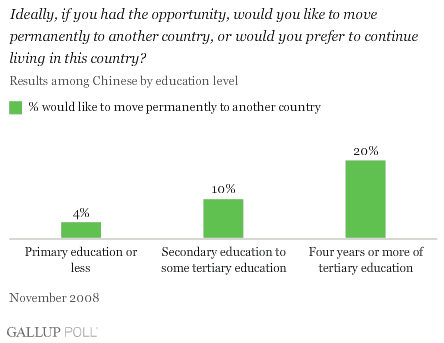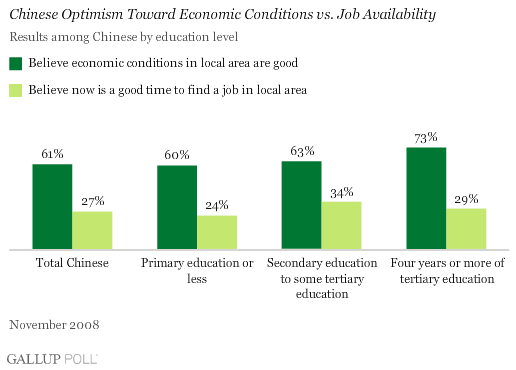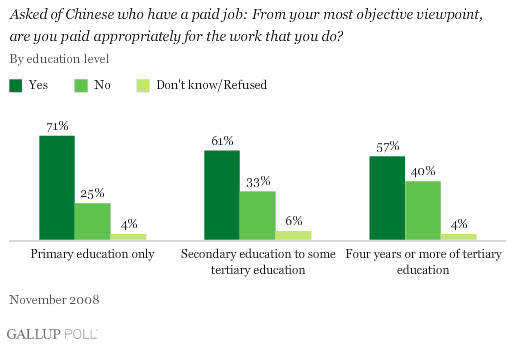WASHINGTON, D.C. -- China's rapid economic growth has been accompanied by equally rapid urbanization, with rural Chinese flocking to urban centers in search of employment opportunities. However, many well-educated, urban Chinese remain dissatisfied with the jobs and educational opportunities available to them and seek to go abroad, draining the country of some of its top talent. Gallup's recent poll of China found that 6% of Chinese overall say they would like to emigrate permanently if they had the opportunity to do so, but among college-educated Chinese the percentage rises to 20%.

The top destination choice among those Chinese who say they would like to move is the United States (28%), followed by South Korea (14%) and France (8%). China has become a huge market for international educational institutions based in these and other developed countries. Chinese leaders' concerns about the resulting outflow of human capital are heightened because many emigrants never return. A 2007 report from the Academy of Social Sciences in Beijing claimed two-thirds of Chinese who have gone abroad to study since the 1980s have not returned. Recently, the Chinese government has been actively working to lure highly educated expats already living in the U.S. -- particularly those with science and engineering backgrounds -- back home with the promise of high-paying jobs.
However, the government has thus far failed to generate widespread optimism about employment opportunities among well-educated Chinese still living in China. Gallup's data indicate that though Chinese residents with a college education are particularly likely to say economic conditions in their communities are good, they are as unlikely as those in other education categories to say it is a good time to find a job in their area.

What's more, many well-educated Chinese who have full- or part-time paying jobs feel they are underpaid; 40% of Chinese with a college education say they are not paid appropriately for the work they do, vs. 25% of those with a primary education only who say the same.

These differences may be attributable to a greater capacity among more affluent, well-educated Chinese to garner information about Western jobs and pay levels through such avenues as travel experiences, jobs at multinational corporations, and access to information technology. For example, 63% of college-educated Chinese say they have access to the Internet at home, vs. 39% of those with a secondary education, and 5% of those with a primary education or less.
Bottom Line
So far, China's economic exuberance has not translated to widespread confidence in job markets. Brain drain will continue to be a concern as long as college-educated Chinese 1) fail to see job growth outpacing the influx of people to the cities and 2) compare their pay levels unfavorably to those of professionals in developed countries.
For complete data sets or custom research from the more than 150 countries Gallup continually surveys, please contact worldpollpartners@gallup.com or call 202.715.3030.
Survey Methods
Results are based on face-to-face and telephone interviews with approximately 4,383 adults, aged 15 and older, conducted in November 2008 in China. For results based on the total sample of Chinese adults, one can say with 95% confidence that the maximum margin of sampling error is ±2.2 percentage points. The margin of error reflects the influence of data weighting. In addition to sampling error, question wording and practical difficulties in conducting surveys can introduce error or bias into the findings of public opinion polls.
